There’s nothing quite like slipping into perfectly warm pool water after a long day. But if you’ve ever experienced the shock of diving into an unexpectedly cold pool, you know how quickly that relaxation can turn into an uncomfortable surprise. Whether you’re a pool owner looking to extend your swimming season or someone considering their first pool heating system, you’ve come to the right place.
I’ve spent years helping pool owners navigate the sometimes overwhelming world of pool heating options, and I understand the frustration of not knowing where to start. The good news? Heating your pool doesn’t have to be complicated or break the bank. In this comprehensive guide, we’ll explore everything you need to know about keeping your pool at the perfect temperature, regardless of the weather outside.
Why Pool Heating Matters More Than You Think
Before we dive into the technical details, let’s talk about why pool heating is such a game-changer for pool owners. I often hear people say, “I only swim in summer anyway,” but that perspective usually changes once they experience the freedom of a heated pool.
Think about it this way: your pool represents a significant investment – often tens of thousands of dollars. Without proper heating, you might only use it 3-4 months out of the year in most climates. That’s like buying a car and only driving it on weekends. Pool heating systems essentially multiply your pool’s value by extending its usable season from a few months to potentially year-round enjoyment.
Beyond the practical benefits, there’s something deeply satisfying about being able to take a warm swim while snow is falling outside, or enjoying your pool during those beautiful spring and fall evenings when the air is crisp but the water is perfectly comfortable.
Understanding Pool Heating Basics: What You Need to Know First
How Pool Heating Actually Works
Many pool owners feel overwhelmed by the technical aspects of swimming pool heaters, but the concept is actually quite straightforward. All pool heating systems work on the same basic principle: they transfer heat energy to your pool water to raise its temperature to your desired level.
The key difference between various pool heating methods lies in where they get that heat energy from. Some systems generate heat by burning fuel (like natural gas), others capture heat from the surrounding air (heat pumps), and some harness the power of the sun (solar systems). Each approach has its own advantages and ideal use cases, which we’ll explore in detail.
Factors That Affect Your Pool Heating Costs
Before choosing a heating system, it’s crucial to understand what influences your pool heating costs. I’ve seen too many pool owners make decisions based solely on upfront costs, only to be shocked by their energy bills later.
The main factors that affect your heating costs include:
- Pool size and volume – Larger pools require more energy to heat and maintain temperature
- Climate and ambient temperature – Colder climates require more heating energy
- Pool usage patterns – How often and when you use your pool
- Desired water temperature – Each degree higher increases energy consumption significantly
- Pool insulation and covers – Proper insulation can reduce heating costs by 50-70%
- Wind exposure – Wind can dramatically increase heat loss through evaporation
Understanding these factors helps you make informed decisions about both your heating system and how to use it efficiently.
The 7 Most Effective Pool Heating Methods
1. Solar Pool Heating: Harness the Power of the Sun
Solar pool heating systems are often the most misunderstood option, but they can be incredibly effective when properly designed and installed. I’ve seen solar systems that barely make a difference and others that maintain perfect temperatures even in challenging climates.
The key to successful solar pool heating lies in proper sizing and installation. A well-designed solar system typically requires solar collectors covering 50-100% of your pool’s surface area. This might sound like a lot, but remember that solar energy is free once the system is installed.
Benefits of Solar Pool Heating:
- Zero ongoing energy costs after installation
- Environmentally friendly with no emissions
- Can extend swimming season by 2-4 months in most climates
- Relatively low maintenance requirements
- Can increase property value
Considerations:
- Higher upfront costs ($3,000-$7,000 for most residential pools)
- Requires adequate south-facing roof space or yard area
- Performance depends on weather and sun exposure
- Slower heating compared to gas or electric systems
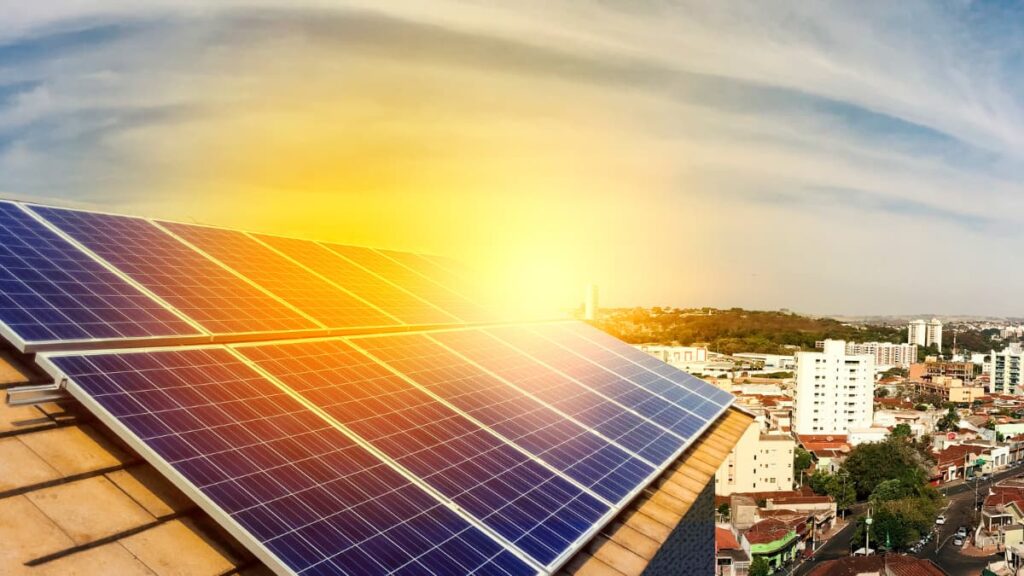
2. Heat Pump Pool Heaters: Maximum Efficiency
Heat pump pool heaters are the efficiency champions of the pool heating world. Instead of generating heat directly, they extract heat from the surrounding air and transfer it to your pool water. This process allows them to produce 3-6 times more heating energy than they consume in electricity.
I often recommend heat pumps to pool owners who want a balance between operating costs and heating performance. While they have higher upfront costs than gas heaters, their operating costs are typically 50-80% lower.
How Heat Pumps Work: Think of a heat pump as a reverse air conditioner. It uses refrigerant to absorb heat from the outside air (even when it’s cool) and concentrates that heat before transferring it to your pool water. This process works efficiently as long as the ambient temperature stays above about 45-50°F.
Benefits of Heat Pump Pool Heaters:
- Extremely energy efficient (300-600% efficiency rating)
- Lower operating costs than gas or electric resistance heaters
- Environmentally friendly with lower carbon footprint
- Consistent heating performance
- Long lifespan (10-20 years with proper maintenance)
Considerations:
- Higher initial cost ($2,500-$5,000)
- Slower heating speed than gas heaters
- Performance decreases in very cold weather
- Requires adequate air circulation around the unit
3. Gas Pool Heaters: Fast and Reliable Heating
When you need your pool heated quickly, nothing beats a gas pool heater. These workhorses can raise your pool temperature several degrees per hour, making them perfect for pools that aren’t used regularly or for those times when you want to swim on short notice.
Gas heaters burn either natural gas or propane to generate heat, which is then transferred to your pool water through a heat exchanger. The process is straightforward, reliable, and effective regardless of outside temperature.
Natural Gas vs. Propane:
- Natural gas is typically less expensive per BTU and more convenient (no tank refills)
- Propane offers more installation flexibility but higher fuel costs
- Both options provide similar heating performance
Benefits of Gas Pool Heaters:
- Fastest heating speed of all options
- Works efficiently in any weather
- Lower upfront costs ($1,500-$4,000)
- Compact size fits most installations
- Instant heat when you need it
Considerations:
- Higher ongoing fuel costs
- Produces emissions (though modern units are quite clean)
- Requires gas line or propane tank
- Shorter lifespan than heat pumps (5-10 years typically)
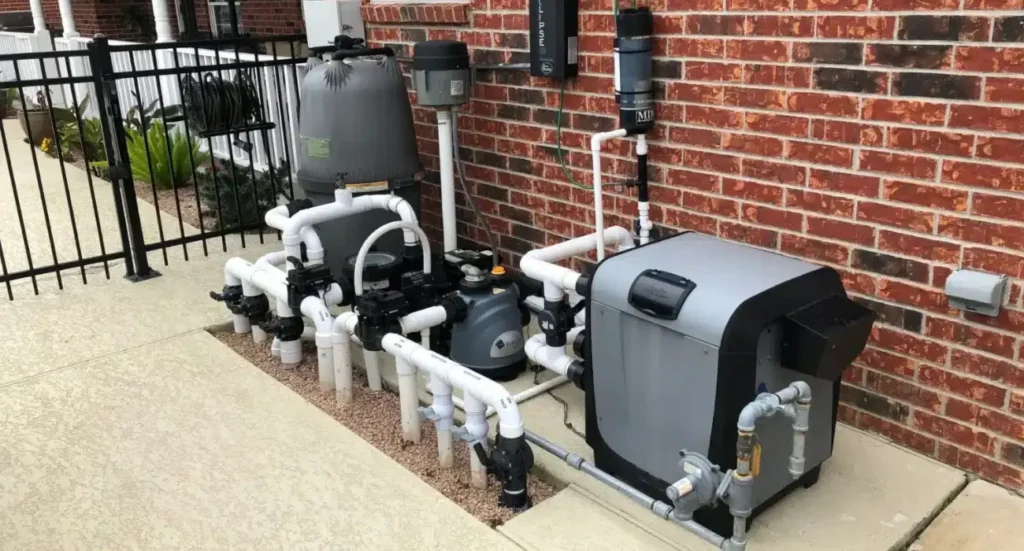
4. Electric Pool Heaters: Simple and Effective
Electric pool heaters use resistance heating elements to warm your pool water directly. While they’re generally the most expensive option to operate, they can be perfect for smaller pools, spas, or situations where gas isn’t available and solar isn’t practical.
These heaters are particularly popular for above-ground pools and smaller installations where the heating load is manageable. They’re also excellent for maintaining spa temperatures or providing supplemental heating for other systems.
Benefits of Electric Pool Heaters:
- Easy installation with no venting required
- Compact and quiet operation
- Precise temperature control
- No emissions at the point of use
- Works in any weather condition
Considerations:
- High operating costs in most areas
- May require electrical service upgrades
- Slower heating than gas options
- Best suited for smaller pools or occasional use
5. Pool Cover Systems: The Unsung Hero of Pool Heating
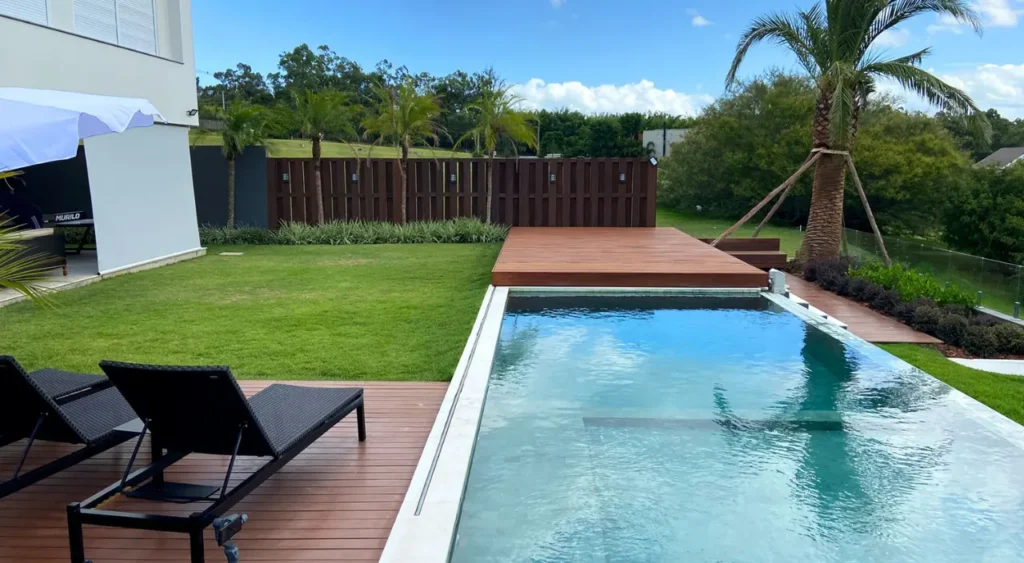
Here’s something many pool owners overlook: a good pool cover can be more effective than any heating system at maintaining your pool’s temperature. I’ve seen properly covered pools stay 10-15 degrees warmer than uncovered pools, even without any additional heating.
Pool covers work by preventing evaporation, which is responsible for 70% of heat loss in most pools. They also provide insulation and reduce the effects of wind cooling.
Read Also: Pool Cover Guide: Complete Solutions for Every Pool Owner
Types of Effective Pool Covers:
- Solar covers: Transparent covers that allow sun energy in while preventing heat loss
- Thermal covers: Insulated covers that excel at heat retention
- Automatic covers: Convenient motorized covers that encourage regular use
- Liquid solar covers: Chemical treatments that reduce evaporation
Benefits of Pool Covers:
- Reduce heating costs by 50-70%
- Decrease water evaporation by up to 95%
- Keep debris out of your pool
- Reduce chemical usage
- Improve safety (solid covers)
6. Hybrid Heating Systems: Best of Both Worlds
Smart pool owners are increasingly turning to hybrid heating systems that combine multiple heating methods for optimal efficiency and performance. The most common combination pairs a heat pump with a gas heater, giving you efficient daily heating with the ability to heat quickly when needed.
For example, you might use your heat pump to maintain your pool’s temperature during regular use, then fire up the gas heater when you want to quickly warm the pool for a weekend party or after a cold snap.
Popular Hybrid Combinations:
- Heat pump primary + gas backup
- Solar primary + heat pump backup
- Solar + gas for quick heating
- Heat pump + electric resistance for extreme cold
7. Geothermal Pool Heating: The Premium Option
Geothermal pool heating taps into the earth’s constant underground temperature to provide incredibly efficient heating. While the installation costs are significant, geothermal systems offer the lowest operating costs and longest lifespans of any heating option.
These systems work by circulating fluid through underground loops that exchange heat with the earth, then transferring that heat to your pool water. The earth maintains a relatively constant temperature year-round, making geothermal systems highly efficient even in extreme weather.
Benefits of Geothermal Heating:
- Lowest operating costs of any system
- Extremely long lifespan (20+ years)
- Works in any climate
- Can also heat and cool your home
- Highest efficiency ratings
Considerations:
- Very high upfront costs ($10,000-$30,000+)
- Requires significant yard space for ground loops
- Complex installation requiring specialized contractors
- Best suited for new construction or major renovations
Choosing the Right Pool Heating System for Your Situation
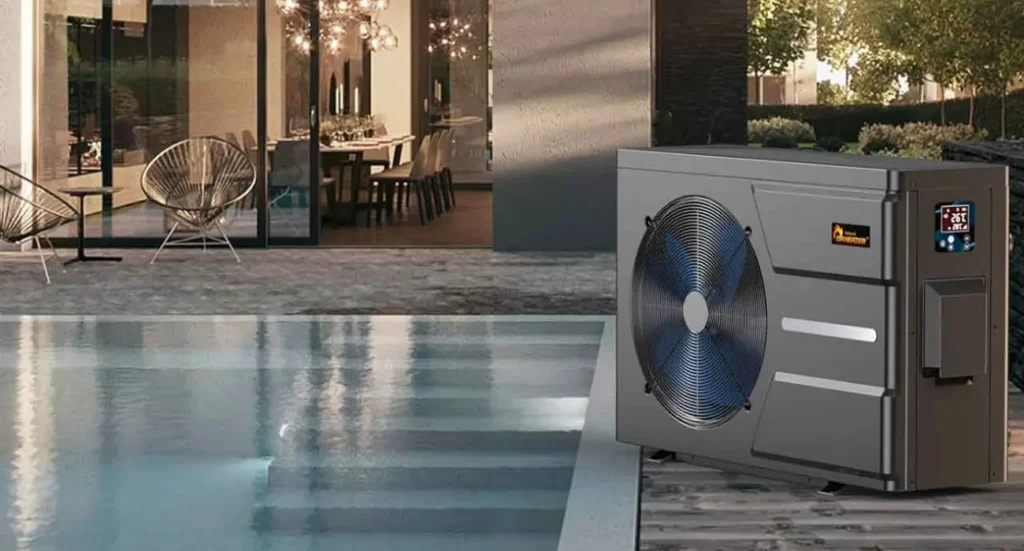
Now that we’ve covered all the major pool heating options, let’s talk about how to choose the right system for your specific situation. I wish I could give you a simple answer, but the truth is that the best heating system depends on several factors unique to your circumstances.
Climate Considerations
Your local climate plays a huge role in determining the most effective pool heating method:
Warm climates (minimal winter freezing):
- Solar heating is highly effective and cost-efficient
- Heat pumps work well year-round
- Gas heaters are good for occasional quick heating
Moderate climates (occasional freezing):
- Heat pumps are often the best balance of efficiency and performance
- Hybrid systems (heat pump + gas backup) work excellently
- Solar can be effective with proper sizing
Cold climates (regular freezing temperatures):
- Gas heaters provide reliable heating regardless of temperature
- Geothermal systems excel in extreme climates
- Heat pumps may struggle in very cold weather
Budget Considerations
Understanding both upfront and ongoing costs is crucial for making the right decision:
Low upfront budget: Gas heaters or electric heaters offer the lowest initial investment Medium budget: Heat pumps provide the best long-term value for most situations High budget: Solar or geothermal systems offer the lowest lifetime costs
Usage Patterns
How you use your pool significantly impacts the best heating choice:
Daily swimmers: Heat pumps or solar systems that provide consistent, efficient heating Weekend warriors: Gas heaters that can quickly heat your pool when needed Seasonal users: Solar systems that extend the swimming season cost-effectively
Installation and Maintenance: What to Expect
Professional Installation vs. DIY
While some aspects of pool heating installation might seem straightforward, I strongly recommend professional installation for most systems. Here’s why:
Gas heaters require proper venting and gas line connections that must meet local codes. Heat pumps need electrical connections and proper refrigerant handling. Solar systems require roof work and precise calculations for optimal performance.
The only heating option that’s truly DIY-friendly is solar covers, and even then, automatic cover systems should be professionally installed.
Maintenance Requirements
Different pool heating systems have varying maintenance needs:
Gas heaters: Annual professional service to clean and inspect components, check for leaks, and ensure proper combustion. DIY tasks include keeping the area around the heater clear and monitoring for unusual noises or smells.
Heat pumps: Quarterly cleaning of the evaporator coils, annual professional service for refrigerant levels and electrical connections. These systems are generally low-maintenance but benefit from regular professional attention.
Solar systems: Minimal maintenance beyond occasional cleaning of collectors and checking for leaks in the system. Most issues are weather-related (like debris blocking collectors).
Electric heaters: Very low maintenance, mainly involving occasional inspection of heating elements and electrical connections.
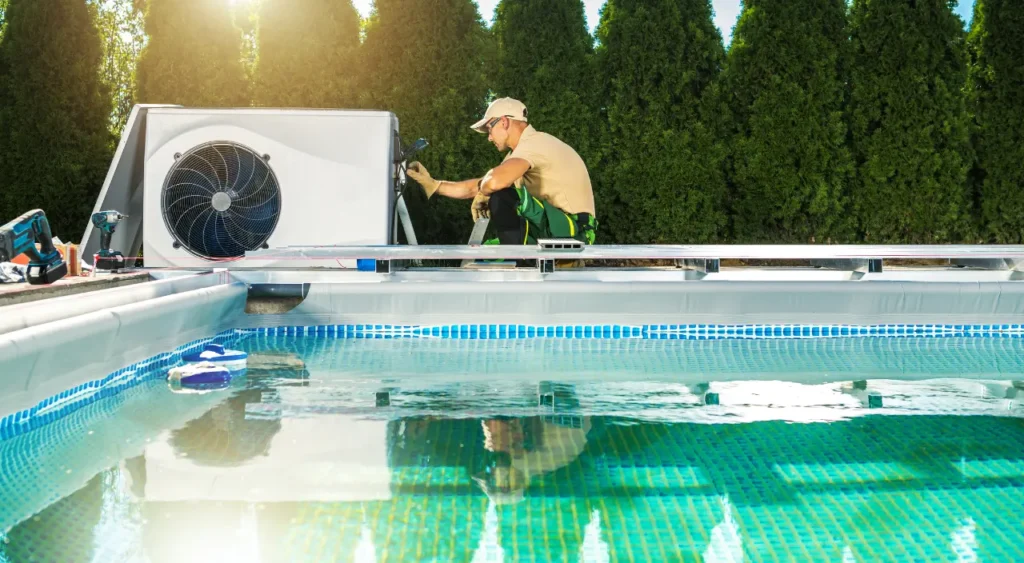
Maximizing Efficiency: Pro Tips to Reduce Pool Heating Costs
Even the most efficient pool heating system can become expensive to operate without proper management. Here are the strategies I share with my clients to minimize their pool heating costs:
Temperature Management
Every degree you lower your pool temperature can reduce your heating costs by 10-30%. Most people find 78-80°F perfectly comfortable for swimming, yet I’ve seen pool owners heating their water to 85°F or higher simply because they can.
Consider using a programmable thermostat to automatically lower the temperature when you’re not using the pool. Even dropping the temperature by 5 degrees overnight can result in significant savings.
Pool Covers Are Non-Negotiable
I cannot stress this enough: if you’re serious about reducing pool heating costs, you must use a pool cover consistently. The difference between covered and uncovered pools is dramatic:
- Uncovered pools can lose 2-8 degrees overnight
- Wind can increase heat loss by 300-500%
- Evaporation accounts for 70% of heat loss in most pools
A $200 solar cover can save you hundreds of dollars per year in heating costs. An automatic cover system, while more expensive upfront, makes it easy to cover your pool every time you’re not using it.
Windbreaks and Landscaping
Strategic landscaping can significantly reduce pool heating costs by minimizing wind exposure. Consider:
- Installing privacy fencing or hedges on the windward side of your pool
- Creating outdoor rooms with walls or screens
- Using retractable windscreens during colder months
Timing Your Pool Heating
Understanding when to heat your pool can dramatically impact your costs:
For heat pumps: These work most efficiently during warmer parts of the day, so running them in the afternoon is typically most cost-effective.
For solar systems: Obviously, these work best during sunny periods, but they can also benefit from strategic timing to maximize heat gain.
For gas heaters: These work equally well any time, but heating during off-peak gas rate periods (where available) can reduce costs.
Common Pool Heating Mistakes to Avoid
In my years of helping pool owners with their heating systems, I’ve seen the same mistakes repeated over and over. Learning from others’ experiences can save you significant money and frustration:
Mistake #1: Undersizing Your Heating System
This is probably the most common and costly mistake. An undersized pool heating system will run constantly trying to reach your desired temperature, leading to high energy bills and shortened equipment life. It’s always better to slightly oversize your heater than to undersize it.
Mistake #2: Ignoring Pool Covers
I’ve met pool owners who spent $5,000 on a high-efficiency heat pump but won’t spend $200 on a solar cover. This is like buying a luxury car and never changing the oil. Pool covers are the single most cost-effective way to reduce heating costs.
Mistake #3: Setting Unrealistic Temperature Expectations
Some pool owners expect their heating system to maintain 85°F water temperature when it’s 40°F outside. While this might be technically possible, it’s extremely expensive and often not necessary for comfortable swimming.
Mistake #4: Poor Timing of Heating System Replacement
Don’t wait until your old heater completely fails to start shopping for a replacement. Emergency replacements often lead to poor decisions and higher costs. Start planning your replacement when your current system is 5-7 years old.
Mistake #5: Neglecting Professional Maintenance
Regular maintenance isn’t an expense—it’s an investment that extends equipment life and maintains efficiency. A well-maintained pool heating system can last 50-100% longer than a neglected one.
Energy efficiency guidelines for pool heating from Department of Energy
The Future of Pool Heating Technology

The pool heating industry continues to evolve, with new technologies and approaches emerging regularly. Here are some trends that are shaping the future of pool heating:
Smart Pool Heating Controls
Modern pool heating systems increasingly include Wi-Fi connectivity and smartphone apps that allow remote control and monitoring. These systems can learn your usage patterns and automatically optimize heating schedules for maximum efficiency.
Variable Speed Technology
Just as variable speed pool pumps revolutionized pool energy efficiency, variable speed fans and compressors in heat pumps are making these systems even more efficient and quieter.
Improved Solar Technology
New solar collector designs and improved glazing materials are making solar pool heating more effective, even in challenging climates. Some systems now include automated sun-tracking capabilities for maximum energy capture.
Hybrid System Integration
The integration of multiple heating technologies is becoming more sophisticated, with smart controls that automatically switch between heating methods based on efficiency and cost considerations.
Making Your Decision: A Step-by-Step Approach
Choosing the right pool heating system doesn’t have to be overwhelming. Here’s a systematic approach to making the best decision for your situation:
Step 1: Assess Your Current Situation
- Measure your pool size and calculate volume
- Evaluate your current usage patterns
- Determine your desired swimming season length
- Assess your budget for both upfront and ongoing costs
Step 2: Evaluate Your Options
- Research heating options suitable for your climate
- Get quotes from multiple contractors for your top choices
- Calculate lifetime costs including purchase, installation, and operation
- Consider financing options if needed
Step 3: Plan for Integration
- Determine if your current electrical or gas service is adequate
- Plan for any necessary upgrades or modifications
- Consider timing for installation (often best in off-season)
- Plan for proper permitting and inspections
Step 4: Choose Your Contractor Wisely
- Get references and check licensing and insurance
- Look for contractors experienced with your chosen heating type
- Ensure they provide detailed warranties on both equipment and installation
- Verify they can provide ongoing maintenance and service
Conclusion: Your Path to Perfect Pool Temperature
Pool heating doesn’t have to be complicated or expensive when you make informed decisions based on your specific situation. Whether you choose the efficiency of a heat pump, the speed of a gas heater, the sustainability of solar, or the luxury of geothermal, the key is matching your heating system to your needs, budget, and usage patterns.
Remember that the most expensive heating system is one that doesn’t meet your needs or costs too much to operate. The best pool heating system for you is the one that provides comfortable water temperature when you want it, at a cost you can afford, with reliability you can count on.
The investment you make in proper pool heating will pay dividends in extended swimming seasons, increased pool usage, and enhanced enjoyment of your backyard oasis. There’s nothing quite like the freedom of knowing you can enjoy a perfectly warm swim whenever the mood strikes, regardless of what the weather is doing outside.
Take your time, do your research, and don’t hesitate to consult with professionals who can help you navigate the options. Your future self will thank you every time you slip into that perfectly heated pool water.
Ready to start your pool heating journey? Begin by determining your pool’s volume and researching local contractors who specialize in your preferred heating method. The perfect swimming temperature is closer than you think.
What questions do you have about pool heating? Have you had experiences with any of these heating methods? Share your thoughts in the comments below – I’d love to help you find the perfect solution for your swimming pool.
FAQ’s
1. What is the most efficient way to heat a pool?
Heat pump pool heaters cost more than gas pool heaters, but they typically have much lower annual operating costs because of their higher efficiencies. With proper maintenance, heat pump pool heaters typically last longer than gas pool heaters. Therefore, you’ll save more money in the long run.
2. What is the best pool heating option?
Pool heat pump: The overall winner for their balance of cost, energy efficiency, and usability. They’re a reliable choice with moderate upfront costs and low running expenses—especially when paired with solar panels. Solar Pool Heating: The most eco-friendly and cost-effective option, perfect for sunny climates.
3. How does pool heating work?
How does it work? An electric pool heater, also known as a heat pump, works by bringing water into a heating tank and then pumping the warmed water back into the pool. The constant exchange of cold and warm keeps your pool heated. There are two types of electric heaters; water-source and air-source.
4. Is heating your pool worth it?
Increased Property Value: For homes with pools, having a pool heating system can add to the property’s value. It’s considered an attractive feature for potential buyers who may want to use the pool year-round. Prevents Algae Growth: Warmer water discourages the growth of algae and other microorganisms.

